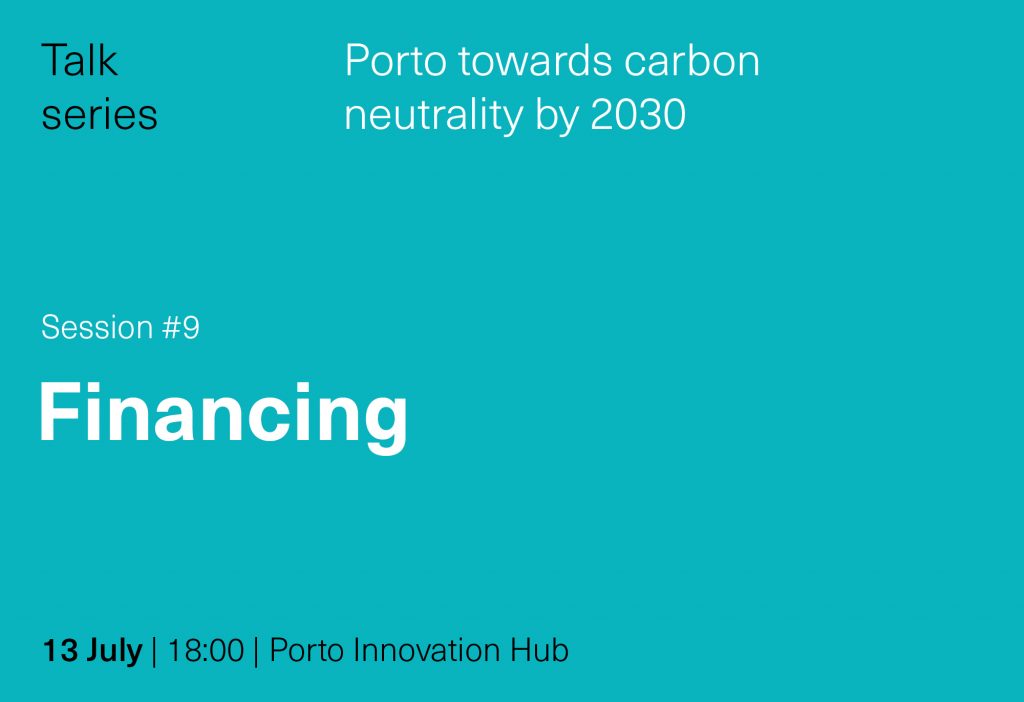
The ‘Talk series – Porto Towards Carbon Neutrality 2030′ is an initiative organized by the Porto City Council, which includes 10 clarification and debate sessions related to the topics of sustainability, decarbonization and climate transition in the context of cities’ carbon neutrality. The ninth session took place last Thursday, July 13, at the Porto Innovation Hub, and was themed ‘Financing’.
Rui Couto Viana, Assistant Professor at the Faculty of Economics of the University of Porto, was the moderator of the event, which included Sofia Santos, Founder of Systemic; Rita Oliveira, Director of Marketing and Communication at GoParity; and Miguel Gouveia, Area Director of the Directorate of Business Experiences – Financing Growth, from Banco BPI.
Each of the speakers had a chance to intervene, followed by a debate and clarification session with the public.
“We all understand that time is a race and we understand that money is fundamental. We have to find alternatives to finance this whole process towards carbon neutrality. It is time for all of us, on different plans, to act to reach the goal we intend,” began Rui Couto Viana, at the opening of the session.
Climate risks make financing difficult
The first intervention of this penultimate session was given by Sofia Santos, who warned that any company wanting to access sustainable financing, whether large or SME, “will have to start reporting how its environmental, social and governance (ESG) practices are because these practices will be a decisive factor for whoever is analyzing the loan”.
“Banks will be encouraged to lend money to those who have the least environmental impact,” she continued, while referring to a study by the ECB that tried to identify the exposure of economies to physical climate risks, which are the impacts that a flood, a drought, etc., can have. “We find that Portugal is one of the European countries with the highest climate risk. This means that the country should create adaptation to climate change and develop resilience mechanisms,” she said.
The founder of Systemic also said that banks “did not like” these results, because “if Portugal has more climate risk, it also means more financial risk, so loans will not be made as easily and the money will cost more”.
In the same logic, Sofia Santos also explained the relationship between the increase in temperature (climate risk) and the increase in world GDP: “In a scenario where the temperature rises 2.6°C by 2050 what is expected is that world GDP decreases 14% and at European level drops 8%. What I mean by this is that there is part of economic theory that we are not including, which is to understand that if the temperature rises, GDP decreases”.
The role of investors
“The role of GoParity is to make individual investors make the transition and move the money that is being lent to fossil fuel industries to projects that avoid CO2 or even capture carbon,” began Rita Oliveira, during the second intervention.
GoParity is a crowdlending platform only for sustainable projects. In this sense, the company’s director of marketing and communication explained that, “on one side there are companies seeking financing and on the other there are people who want to invest”. “People lend money to these companies that are looking for financing and who then return the money with interest. The advantage is that, in addition to receiving the interest and investing, each person can monitor the relative impact of their investment,” she added.
Although they started with solar energy projects for self-consumption, in which energy communities were included, the platform has now worked with private companies: “Some of the companies we work with have access to this PRR financing and others, but they need treasury support to start these projects and that’s where we come in”.
Public support and the importance of banks in dissemination
“In terms of public support, in the next few years, there will be a lot of money. We are talking about about 50 billion euros, of which 15 billion are directly for companies, but we all know that this money will not be enough and that companies will need their own funds and external capital,” said Miguel Gouveia in turn.
At this point, the BPI manager highlighted the role of banks in supporting companies in this transition: “We think that the role of banks should not only be to finance, but should have two aspects: the first is to inform, strengthen and dynamize all ecosystems linked to sustainability factors and then finance”.
In order to make this process of finding available support more agile and practical, BPI provided a universal and free access platform for all companies, where all public supports for companies are gathered, both nationally and at the European level. “The idea was to gather information about all these supports in one place, on one platform,” he said.
In this sense, the bank also created three BPI lines: a credit line intended to support companies in the transition to sustainability, financing SMEs that privilege ESG factors in their strategy and/or their investments; a credit line aimed at financing energy efficiency projects carried out in national territory by companies resident and operating in Portugal, and another line that is intended for financing SMEs, Small Mid-Cap and Small Public Sector Companies, with long-term economic viability, which need financial support for the realization of investments focused on sustainable transition, digitization and innovation and support for the cultural and creative sectors.
“All these lines aim to finance investments or support companies that want to commit to achieving certain sustainability ratios,” he concluded.
